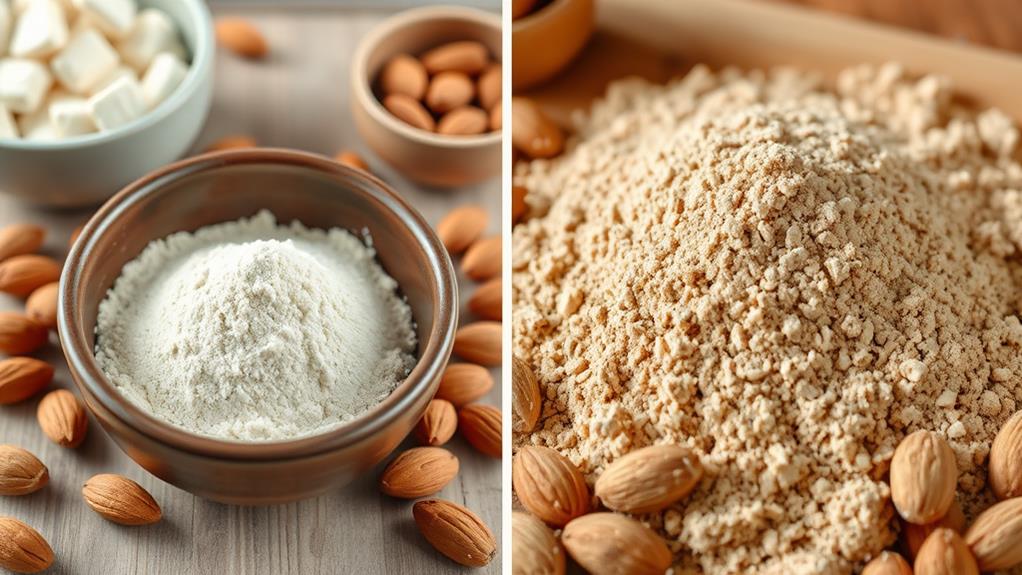Almond flour is a fantastic keto-friendly option because it's low in carbs, offering only about 3g of carbs per 2 tablespoons. Rich in healthy fats and fiber, it supports satiety and helps maintain steady energy levels. Plus, its low glycemic index aids in stabilizing blood sugar, making it an ideal choice for your ketogenic diet. Unlike traditional flours, almond flour also keeps your meals gluten-free and is packed with essential nutrients. If you're curious about how to incorporate almond flour into your recipes effectively, stick around to discover some delicious options!
Understanding Almond Flour
When you think about low-carb baking, almond flour often comes to mind as a popular alternative to traditional wheat flour. This ingredient is low in carbs, making it a keto-friendly choice for those following a low-carb lifestyle. With just about 3 grams of carbs per 2 tablespoons, almond flour allows you to indulge in baked goods without derailing your dietary goals. Incorporating keto-friendly sugar substitutes can further enhance your low-carb baking experience.
Almond flour is made from finely ground blanched almonds, which means it's gluten-free and suitable for individuals with gluten sensitivities. Not only does it provide a delicious nutty flavor, but it's also packed with healthy fats, particularly monounsaturated fats that support heart health. These fats help maintain ketosis by serving as an alternative energy source.
Additionally, almond flour has a low glycemic index, which helps stabilize blood sugar levels. This makes it a smart option for anyone managing diabetes or insulin sensitivity.
You'll find that almond flour is versatile, allowing you to create a variety of keto-friendly baked goods like bread, muffins, and cookies. With its rich nutrient profile, almond flour is a fantastic addition to your low-carb baking arsenal.
Nutritional Breakdown of Almond Flour
Almond flour boasts an impressive nutritional profile that makes it a standout choice for those on a keto diet. With approximately 16.25g of total carbohydrates per 100g, it offers a low net carb count of about 6.98g after accounting for its high fiber content, which is around 9.27g. This makes almond flour a keto-friendly option for maintaining your carb limits, as its high fiber content promotes satiety and aids in weight management.
One of the most appealing aspects of almond flour is its high fat content, providing around 50.23g of healthy fats per 100g, which supports heart health and contributes to a steady source of energy. Additionally, each 100g serving delivers about 26.24g of protein, which is great for muscle maintenance and keeping you feeling full longer.
Beyond these macronutrients, almond flour is packed with essential nutrients, including 666.8mg of potassium and 251.1mg of magnesium per 100g. These nutrients support your overall health while adhering to keto guidelines.
To summarize, the nutritional breakdown of almond flour makes it an excellent staple in your keto-friendly diet.
Health Benefits of Almond Flour

Almond flour packs a punch when it comes to nutrient density, providing essential vitamins and minerals that support your overall health.
Its low glycemic index helps you maintain stable blood sugar levels, making it a smart choice if you're watching your glucose. Additionally, almond flour is rich in healthy monounsaturated fats, which are beneficial for heart health and can contribute to weight management through increased satiety its nutritional benefits.
Plus, the high fiber content keeps you feeling full, which can be a game-changer for weight management.
Nutrient Density Advantages
Often overlooked, almond flour offers impressive nutrient density that makes it an excellent choice for those on a ketogenic diet. As an almond flour keto-friendly option, it's low in net carbs, containing just 3 grams per 13-gram serving. This helps you stay on track with maintaining ketosis while still enjoying a tasty alternative to traditional flours.
One of the standout features of almond flour is its rich content of essential nutrients. It's packed with magnesium, vitamin E, and potassium, all of which support overall health and metabolic function.
Plus, with about 6 grams of dietary fat per serving, it aligns perfectly with the high-fat requirements of a keto lifestyle.
The high fiber content in almond flour, around 2 grams per serving, not only aids digestion but also promotes satiety. This can be particularly beneficial as you work towards your weight loss goals within the keto framework.
Blood Sugar Control
Maintaining stable blood sugar levels is essential for overall health, especially when following a ketogenic diet. Almond flour is a fantastic option for this purpose, as it has a low glycemic index that helps stabilize blood sugar levels and prevents rapid spikes after meals. With only 3 grams of carbohydrates per 13g serving, almond flour considerably supports better blood sugar management compared to traditional higher-carb flours.
The high fiber content, approximately 2 grams per serving, assists digestion and contributes to slower absorption of sugars into your bloodstream. This slower absorption is key for effective blood sugar control.
Additionally, almond flour is rich in healthy fats, primarily monounsaturated fats, which promote satiety and reduce the likelihood of overeating. This can further stabilize your blood sugar levels.
Moreover, nutrients like magnesium found in almond flour are linked to improved insulin sensitivity, enhancing your overall metabolic health.
Almond Flour in Keto Recipes
Almond flour isn't only low in carbs, but it's also rich in healthy fats and protein, making it an ideal choice for those following a ketogenic diet. With a low carb count of around 3g per two tablespoons, it's perfect for keeping your daily carb intake in check.
Plus, its fiber content, approximately 2g per serving, helps with digestion and supports weight management. Nutritional benefits of almond flour contribute to overall wellness and satisfaction.
Almond flour's mild, nutty flavor enhances both sweet and savory dishes, making it a versatile choice for various recipes. Here are some popular options you can try:
- Pancakes
- Muffins
- Low-carb pizza crusts
- Bread
Being gluten-free, almond flour is an excellent option for those with gluten sensitivities or celiac disease.
However, remember that recipes incorporating almond flour often require adjustments in liquid and binding agents to achieve the right texture and flavor in your baked goods.
Comparing Almond Flour and Almond Meal

Many people wonder about the differences between almond flour and almond meal, especially when choosing the right ingredient for their keto recipes.
Almond flour is made from blanched almonds, resulting in a fine texture perfect for baking light and fluffy goods. In contrast, almond meal includes the skins, giving it a coarser texture that works well as a heartier substitute for breadcrumbs.
Both options are part of the broader category of nut-based flours, which offer unique flavors and textures beneficial for various keto dishes.
Both almond flour and almond meal are keto-friendly and low in carbohydrates, but almond flour typically boasts a lower net carb count, making it ideal for those on strict keto diets.
For instance, a 13g serving of almond flour contains about 3 grams of carbohydrates and 6 grams of dietary fat, while almond meal has a similar profile but may vary slightly in fiber content.
When it comes to baking, if you're after cakes and pastries that require a delicate consistency, almond flour is your best bet.
However, if you're making a dish that benefits from a more robust texture, almond meal is a great choice.
Understanding these differences can help you make the best decision for your keto-friendly recipes.
Alternatives to Almond Flour
If you're looking for alternatives to almond flour, coconut flour is a popular choice, but it requires extra moisture in your recipes due to its absorbent nature.
Low-carb flour options like hazelnut flour and walnut flour can also provide unique flavors and textures while keeping your carb count low.
For those with nut allergies, sunflower seed flour offers a similar carb profile without the risk of nuts.
Exploring these options can help you maintain your keto diet while adding variety to your baking.
Coconut Flour Comparison
While both coconut flour and almond flour are popular alternatives for those following a keto diet, they've distinct characteristics that can greatly impact your baking outcomes.
If you're weighing coconut flour as a flour substitute, keep in mind its higher carb content and unique properties.
Here are some key differences to weigh:
- Carb Content: Coconut flour has about 9g of total carbs per 2 tablespoons, compared to almond flour's 3g.
- Moisture Absorption: Coconut flour absorbs a lot of liquid, requiring you to adjust your recipes for moisture.
- Texture: Almond flour provides a spongy texture, while coconut flour often results in denser baked goods.
- Versatility: Almond flour is preferred for its nutty flavor and flexibility in both sweet and savory dishes, making it a more keto-friendly option.
If you're strict about your carb intake, almond flour may be the better choice for your baking needs.
However, if you want to experiment with different textures and flavors, coconut flour could still be a viable option—just remember to tweak your recipes accordingly!
Nut-Free Options Available
When you're looking for nut-free alternatives to almond flour, several options can fit seamlessly into your keto baking.
One popular choice is coconut flour. It contains lower carbs—just 9g total, 4g net per 2 tablespoons—but it absorbs moisture like a sponge, so you'll need to adjust your liquid ingredients accordingly.
Another great nut-free option is sunflower seed flour. This flour alternative mimics almond flour's texture and can be used in a 1-to-1 ratio in your recipes. Just keep in mind that it may cause your baked goods to discolor slightly.
If you're venturing into savory dishes, chickpea flour offers a gluten-free option, though it's higher in carbs than almond flour.
For binding and moisture, consider flaxseed meal, which has minimal carbs (4g total, 0g net per 2 tablespoons) and is rich in omega-3 fatty acids.
Lastly, psyllium husk powder is a high-fiber, nut-free option that can enhance the texture of your baked goods when combined with other flours.
With these nut-free flour alternatives, you can enjoy delicious keto baking without worrying about allergens.
Tips for Using Almond Flour

Almond flour is a versatile ingredient that can elevate your keto baking. With about 6 grams of net carbs per 100 grams, it fits well within the daily carb limits of a keto diet. Additionally, almond flour is gluten-free, making it suitable for individuals with gluten sensitivities or celiac disease, and it offers essential nutrients like vitamin E and magnesium, which are beneficial for overall health.
However, to get the best results, keep these tips in mind:
- Watch your portion sizes: Large servings can cause you to exceed your daily carb allowance quickly.
- Combine with low-carb flours: Mixing almond flour with coconut flour can reduce overall net carbs while still achieving the desired texture in your recipes.
- Adjust moisture levels: Almond flour absorbs moisture differently than traditional flours, so be ready to increase the liquid or binding agents in your recipes.
- Enjoy the fat content: With around 50 grams of fat per 100 grams, almond flour can enhance satiety, making it a perfect ingredient for keto-friendly food.
This high-fat content, combined with its nutty flavor and moist texture, makes it an excellent substitute for traditional bread products.
Popular Keto-Friendly Recipes
Keto-friendly recipes utilizing almond flour are a game changer for anyone looking to maintain a low-carb lifestyle without sacrificing flavor. One popular choice is almond flour pancakes, which typically contain around 3g of net carbs per serving. They make an excellent low-carb breakfast option that keeps you satisfied and energized throughout the morning.
For those with a sweet tooth, try making Keto Almond Flour Brownies. These delicious treats satisfy your chocolate cravings while ensuring you stay within your carb limits, thanks to their low net carb content.
If you're in the mood for pizza, almond flour also shines as a base for keto-friendly pizza crusts. You can enjoy a guilt-free pizza night without worrying about high-carb options.
Almond flour is also perfect for keto dessert recipes, like Sugar-Free Pumpkin Cheesecake Pie, which typically has 5-6g of net carbs per slice. This way, you can indulge in delightful baked goods while adhering to your low-carb diet.
With these tasty options, almond flour proves to be an indispensable ingredient for anyone committed to keto recipes that don't compromise on taste.
Incorporating Almond Flour in Diet

Incorporating almond flour into your diet offers numerous nutritional benefits, making it a great choice for keto enthusiasts.
You can easily substitute it in your favorite recipes, from pancakes to bread, while keeping your carb intake low.
Plus, being mindful of portion control will help you maximize its advantages without compromising your dietary goals.
Nutritional Benefits Overview
When you're looking for a low-carb flour alternative, almond flour stands out as a nutritious option that fits seamlessly into your diet. With only about 6 grams of net carbs per 100g, it's perfect for maintaining ketosis on a keto diet.
This flour is loaded with healthy fats, boasting around 50.23g per 100g, which supports your metabolic health and keeps your energy levels up.
In addition to its low carb content, almond flour offers several nutritional benefits:
- High fiber content (approximately 9.27g per 100g) aids digestion and helps you feel fuller.
- Rich in vitamin E, it provides antioxidant protection and contributes to heart health.
- Contains significant amounts of magnesium (251.1mg), essential for various bodily functions.
- Its low glycemic index helps stabilize blood sugar levels, making it ideal for those managing their glucose.
Versatile Recipe Applications
Almond flour's nutritional benefits make it a fantastic choice for a variety of recipes that fit into your keto lifestyle. This versatile ingredient is a popular substitute for all-purpose flour in keto baking, enabling you to whip up low-carb versions of classic favorites like pancakes, muffins, and bread.
With a low net carb count of about 1g per 2 tablespoons, almond flour helps you stay on track while enjoying delicious treats. You can also create keto-friendly pizza crusts using almond flour, providing a satisfying alternative to high-carb options without compromising on flavor or texture.
It serves as a key ingredient in nutrient-dense snack bars and breakfast cereals, enhancing both satiety and nutritional value thanks to its high fiber and healthy fat content. Additionally, almond flour works great as a coating for meats and vegetables, offering a gluten-free option that adds a nutty flavor and crispy texture to dishes like baked chicken and fish.
When it comes to satisfying your sweet tooth, recipes like almond flour brownies and sugar-free cookies keep your cravings in check while adhering to keto guidelines.
Portion Control Strategies
Maintaining portion control is vital for successfully integrating almond flour into your keto diet. With approximately 6.98g of net carbs per 100g, it's important to monitor your intake to remain within the daily carb count of 20-50g. A typical serving of almond flour is around 13g, providing about 3g of carbohydrates.
By consuming it in moderation, you can easily fit almond flour into your keto cooking.
Here are some strategies for portion control:
- Use measuring tools like kitchen scales or measuring cups to guarantee accurate serving sizes.
- Combine almond flour with lower-carb alternatives, such as coconut flour, to reduce overall net carbs.
- Track your daily carb intake, including almond flour, to maintain ketosis and avoid exceeding your carb allowance.
- Plan your meals in advance, incorporating almond flour thoughtfully to stay on track with your keto lifestyle.
Market Trends for Keto Products
As the popularity of ketogenic diets continues to grow, the market for keto products is experiencing significant transformation. Valued at USD 9.57 billion in 2019, this market is projected to grow at a 5.5% CAGR through 2027. The driving forces behind this are increasing health concerns and a rising demand for low-carb products.
You'll notice that businesses are catering to specific macronutrient needs, especially in the food and snack sectors, to align with consumer preferences.
People are opting for clean eating and nutrient-dense options, leading to a surge in the usage of keto-friendly ingredients like almond flour. This versatile, low-carb alternative is becoming a staple in many products, reflecting the evolving focus on healthier dietary choices.
In addition, the growing awareness of the metabolic health benefits and weight reduction associated with ketogenic diets is sparking innovation in product formulations.
With more companies incorporating almond flour into their lines, you can expect to see a wider range of keto-friendly options that cater to your dietary needs.
This trend not only supports your low-carb lifestyle but also addresses health concerns that many people are increasingly aware of today.
Conclusion
Incorporating almond flour into your keto diet is a delicious and nutritious choice. With only 10 grams of carbs per 100 grams compared to wheat flour's 76 grams, you can enjoy your favorite baked goods without guilt. Plus, its high healthy fat and protein content keeps you satisfied longer. As you explore keto recipes, remember that almond flour not only enhances flavor but also supports your health goals, making it a versatile staple in your kitchen.







